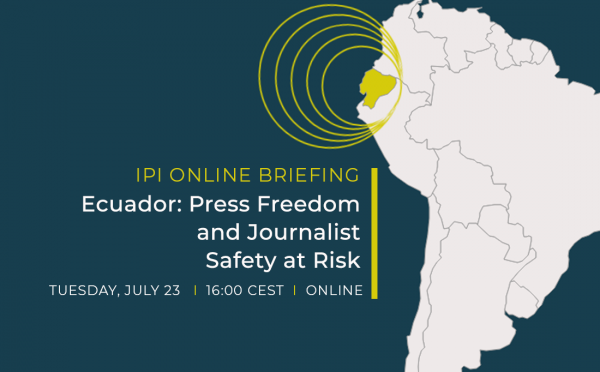Last week’s sentencing of a Bolivian news magazine editor convicted of slandering a government lawyer to two-and-a-half years in prison underscores the urgency with which Bolivia must revisit its criminal-defamation laws, the International Press Institute (IPI) said today.
The editor, Rogelio Peláez of Larga Vista, had been the defendant in a suit brought by Walter Molina, whom Peláez had accused of collective excessive attorney fees while representing the government in a case involving the country’s social-security program. A La Paz judge found Peláez guilty of defamation and slander as well as a third offense, the distribution of slanderous material, news reports said.
Peláez, who said through his lawyer that he planned to appeal, told media outlets that his article detailing Molina’s alleged activities, titled “Un robo con la ley en la mano” (roughly: “Robbery through the Law”) was “well documented.”
He added, “We journalists, by nature, question power … thinking, discerning, analyzing, commenting, having an opinion should never be punished, the truth is never slander,” according to El Diario.
In Bolivia, criminal cases involving the media are normally regulated by the country’s Press Law, which received attention earlier this year when President Evo Morales dropped plans to replace the statute with a newer version, a move Bolivia’s National Press Association had feared would “affect the guarantee of freedom of the press and expression.” Bolivian media appears to be unanimous in viewing the Press Law as an critical guarantor of its rights.
However, the Press Law (Art. 27) specifically states that defamation cases in which the plaintiff is an individual person are to be handled under the country’s general penal code. The latter defines defamation (Art. 282) as the “revealing of a fact, quality, or action that affect the reputation of a person” and slander as “the false attribution of a crime” to another person (Art. 283).
Commenting on the Press Law’s defamation exception, Antonio Vargas, an attorney for the La Paz Journalists Association (APLP, in Spanish), told La Razón, “having had two options [on defamation] – to go with the Press Law or the Penal Code – it’s naturally absolutely clear that the Penal Code was preferred. That proves that we [the media] aren’t untouchable.”
IPI Press Freedom Manager Anthony Mills said, “In no instance should a journalist be sent to prison for investigating matters of public interest. We strongly condemn the sentence in Mr. Peláez’s case, which has the potential to lead to self-censorship among the wider media. Ultimately, Bolivia’s criminal-defamation law poses a threat to a people’s right to information, and we urge the government to consider its repeal.”
During a recent visit by President Morales to Vienna, IPI asked the Andean leader about his decision not to amend the Press Law and whether he planned to support other legal measures that could have consequences for journalists. Morales avoided answering that question, but did comment to IPI on a range of to other issues related to press freedom in Bolivia, which he said was “exaggerated.”
Mills added that IPI was concerned by an apparent increase in criminal-defamation cases across Latin America. Last month, three owners and an editor of Ecuador’s El Universo newspaper were each sentenced to three years in prison after publishing an article critical of President Rafael Correa, who later pardoned the four men.
Also in February, a provincial court in Colombia upheld the year-and-a-half prison sentence of a journalist who had been convicted of slandering a former senator. In the Dominican Republic, a radio commentator was sentenced to six months in prison and ordered to pay a fine of 1 million pesos – 200 times the maximum allowed under the country’s laws – after being found guilty of libeling a lawyer.
Mills said the slew of recent cases confirms that press freedom is under serious strain in Latin America. “While numerous governments around the world are moving to abolish outdated criminal-defamation laws, Latin American officials at both the national and local levels are increasingly turning to such laws to silence media criticism,” he observed.
IPI is a leading voice in the campaign against criminalised defamation, and is currently involved in efforts to abolish the offence in the Caribbean, including the Dominican Republic.
In June, media leaders from across the globe will converge in Trinidad and Tobago for IPI’s 2012 World Congress, the first time in 25 years that the event will take place in Latin America or the Caribbean.


